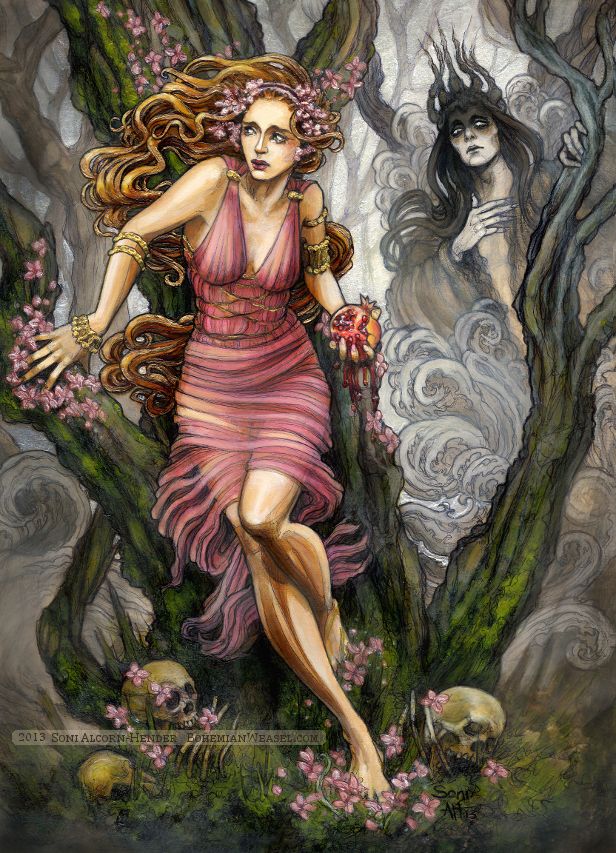This is my second article in this series about the fascinating subject of mythology. This time, I’ll talk about a specific Greek goddess’s tale: Persephone, and her kidnapper – I mean husband. It also tells the Greeks’ story of the seasons changing.
Who was Persephone? She was the goddess of springtime, daughter of Zeus, god of the sky and Demeter, goddess of grain. Surprise, surprise, Persephone liked sunshine and picking flowers in green meadows. She was beautiful, with pale skin, an oval face, often wearing a gossamer white, flowing dress, and a circlet of flowers upon her head. But Demeter was incredibly protective of her because Persephone was her absolute favourite child. She refused to let any god marry her daughter. Unluckily for her, one of them had already fallen deeply in love with the girl; it was none other than Hades, the Lord of the Underworld. I know what you’re thinking: “What a perfect match! The goddess of springtime, who loves sunlight and the god of the Underworld, who lives in a gloomy place with no sun and a lot of dead souls!” Hades knew it was hopeless too, but, try as might, he couldn’t get Persephone out of his head.
Finally, when he couldn’t take it anymore, the god left his palace and journeyed to Mount Olympus. There, he talked to Zeus, Persephone’s father, Lord of the Universe, and, of course, Hades’ younger brother. Zeus gave him permission to marry his daughter. However, the brothers knew that Demeter would never allow it, so they devised a clever plan…
One day, Persephone was out picking flowers with some of her nymph friends, as usual. As they were frolicking in the fields, a stunning flower, sometimes said to be a narcissus, caught her eye. She strayed slightly away from her companions to pick it, which turned out to be a very bad idea. Just as she leaned down to reach it, a great fissure opened up in the Earth and a chariot as black as coal emerged from the chasm below. The rider grabbed her and pulled her into the chariot as it disappeared back under the ground. Persephone did what anyone would have. She screamed. Her friends had no idea what had happened, but one person saw Persephone’s kidnapping: Helios, the god of the Sun, saw it unfold as he drove his Sun chariot across the sky.
When Demeter realised her precious daughter was missing, she freaked out. She had a complete meltdown, until Hecate, the Titan-goddess of magic, approached her and suggested she consult Helios. Helios confessed what he had seen, including that Zeus and Hades were responsible. He also suggested that, since Hades had a lot of power, the Lord of the Underworld might be a good husband for Persephone (naturally, Demeter didn’t believe that part). Now, in addition to being worried, she was enraged. As she searched for her daughter, she neglected her duty as the goddess of grain, which turned out to be a lot more important and impressive than it sounded. Everywhere, crops withered and died. Nothing grew, leaving the land barren. People starved and perished, which annoyed the gods as well. They had their own godly food, called ambrosia, and their drink, nectar, so they were healthy, but when the mortals starved, they couldn’t make offerings to the immortals, or build temples, or worship them. As you might imagine, the gods did not like this.
Meanwhile, down in the Underworld, Persephone hated it. Luckily for her, Zeus became so annoyed about the whole ‘mortals dying and not worshipping them’ situation that he ordered Hermes, the messenger god, to bring Persephone back from Hades’ realm. The god Hades was devastated, especially because now he wouldn’t be able to fight back; he may have been powerful, but remember that Zeus was the Lord of the Universe, so he couldn’t do anything about it… or could he?
Somehow, Persephone, before she left, tasted the food of Hades (which is another name for the Underworld, as well as the name of the god. Yes, it’s confusing) – a few pomegranate seeds to be exact. However, she didn’t know that whoever ate any of the Underworld’s food had to stay there forever, even if it was just a bit of pomegranate. Suddenly, Zeus’ plan had a slight issue. Demeter refused to accept that her daughter would forever stay in the dark realm of Hades. They finally settled on a compromise; for part of the year, Persephone would stay with her mother, while for the other part, with her husband. Persephone eventually fell in love with her kidnapper, which was probably good for her. In the months when her daughter was in the upper world, Demeter let the plants thrive, overjoyed, and these became the summer months. But when Persephone was with Hades, Demeter didn’t let the plants grow, and those became, you guessed it, the winter months.
So there you have it: the tale of Persephone, and how she became the rope in a godly game of tug of war between Hades and Demeter, as well as how one flower (the one that Persephone separated from her friends to pick and got her kidnapped) nearly destroyed the entire human race. She eventually became the Queen of the Underworld. Spring will soon arrive, so according to the Greeks, Persephone will soon rise from Hades to the upper world.
Bibliography
- Persephone – Greek Goddess of the Underworld and Flowers
- What did the Greek Goddess Persephone look like?
- Persephone :: Queen of the Underworld
- PERSEPHONE – Greek Goddess of Spring, Queen of the Underworld (Roman Proserpina)
- https://www.theoi.com/Khthonios/Hekate.html#:~:text=HEKATE%20(Hecate)%20was%20the%20goddess,heaven%2C%20earth%2C%20and%20sea.


